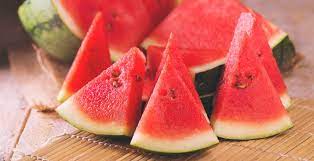Did you know that eating watermelon is good for men’s health? This delicious summer fruit offers significant amounts of vitamin A, C, and B6, lycopene, and antioxidants (opens in new tab)nts, as well as plenty of potassium.
It’s also a great source of magnesium and iron, two nutrients that are vital to men’s sexual health. Plus, it’s low in calories and free of fat.
Vitamin C
Watermelon is a popular choice for summertime snacks and meals, but did you know that it’s also good for your health? This fruit is packed with vitamins, minerals, and antioxidants that can help keep you healthy and may even reduce your risk of certain cancers.
Vitamin C is an important nutrient for many things, including immunity and muscle repair. It’s also an antioxidant that can help fight free radical damage to cells in your body.
It’s important for cardiovascular health because it helps prevent artery-clogging plaque and can reduce inflammation. It’s also associated with lowering cholesterol levels, which can protect against heart disease.
Adding watermelon to your diet can help you boost your vitamin C intake, especially if you’re not getting enough from other sources. This is because it’s a good source of lycopene, which is an antioxidant that can ward off free radicals.
Another antioxidant in watermelon is citrulline, which can help improve blood flow to the heart. Citrulline is a non-essential amino acid that is involved in the formation of arginine. Vidalista 10 and Cenforce 200mg can help lower blood pressure and improve blood flow in men.
The vitamin C in watermelon also works to boost your immune system and may help you fight off infection. It’s also known to aid in the absorption of iron, which is necessary for building red blood cells.
In addition to these benefits, watermelon is a good source of potassium, which can help lower high blood pressure and improve nerve function. It’s also a great source of magnesium, which is needed for muscle recovery after exercise.
Finally, watermelon contains phytosterols, plant compounds that can help balance cholesterol in your blood. These phytosterols are also a source of fiber, which can help control weight and promote digestive health.
A recent study found that women who ate at least two servings of watermelon each day had a lower body mass index than those who didn’t eat the fruit. This could be due to the high levels of potassium and lycopene in the fruit, as well as the phytosterols and fiber it contains.
Vitamin A
Did you know that eating watermelon is good for men’s health? That’s because it contains plenty of vitamins and minerals that can improve your overall health. Vidalista 20 Review which helps the body to be strong for Men’s health.
Vitamin A, for example, is essential for cellular reproduction and for the health of your eyes, skin, bones, and immune system. It also protects against eye disorders like cataracts and age-related macular degeneration.
Each 100-gram serving of fresh watermelon contains 569 IU or 19 percent of the RDA of this important vitamin. It also contains lycopene, which is a powerful antioxidant.
This antioxidant may lower oxidative stress and help prevent cancers, cardiovascular disease, and diabetes, according to some research. It may also help prevent some types of kidney disease and reduce the risk of high blood pressure.
Another important nutrient in watermelon is potassium. This mineral combats the high levels of sodium that can cause high blood pressure, which is a leading cause of heart disease. It’s a key nutrient for regulating your blood pressure as you get older.
It’s also vital for preventing and treating kidney stones. Eating potassium-rich foods is linked to a lower risk of developing kidney stones, and it can decrease the likelihood of urinary tract infections.
Similarly, the amino acid citrulline in watermelon helps your body produce nitric oxide, which promotes good blood flow and muscle function. It also reduces ammonia, a substance that builds up in your muscles after exercise and can lead to muscle soreness.
Finally, watermelon’s high amounts of lycopene can reduce the risk of prostate and colon cancers. The antioxidant scavenges free radicals and fights inflammation, which can cause tumor growth.
A large, fresh watermelon provides more than 4532 ug of lycopene, which is much more than the equivalent amount found in raw red tomatoes (2573 ug).
Lycopene in watermelon has also been shown to help prevent bladder cancer, and it can help reduce the symptoms of benign prostatic hyperplasia, a condition that increases urination problems in men. It’s also a good source of phytosterols, which are plant compounds that may help lower cholesterol levels.
Magnesium
If you’re a man, you might have heard about magnesium, but you may not know why it’s so important for your health. It plays several roles in your body, including supporting bone and heart health.
The nutrient also boosts testosterone production and decreases your risk of developing metabolic conditions like diabetes. It also helps you sleep well and manage stress.
A low magnesium level can cause many health problems. These include high blood pressure, heart disease, and type 2 diabetes.
You can get plenty of magnesium through a variety of foods. Some of the best sources include chia seeds, almonds, pumpkin seeds, salmon, and dried figs.
But if you don’t eat enough magnesium-rich foods, or if you’re sensitive to them, supplements can be a great way to make up for this. Check with your doctor or pharmacist to find out how much you should be taking and which brands of supplements are best for you.
Magnesium is essential for energy production in the body. It is required for the creation and conversion of adenosine triphosphate (ATP), the energy molecule that powers every cell in your body.
Insufficient levels of this mineral can increase your risk of depression. It’s also important for regulating the mood-boosting chemical serotonin.
Getting the recommended amount of this mineral each day is especially crucial for men, who are more likely to suffer from magnesium deficiency than women. A recent study suggests that 48% of adult men in the United States consume less than their recommended intake of this nutrient.
This is a big deal because magnesium can help prevent serious medical conditions. In addition to its role in reducing your risk of cardiovascular diseases, the nutrient is also important for bone health and helps your body absorb calcium and potassium.
It can also help reduce your risk of chronic stress, which is known to lead to elevated cortisol levels in the body. Symptoms of chronic stress can include fatigue, headaches, depression, and anxiety.
In addition, low levels of magnesium can lead to a weakened immune system and increase your risk of developing autoimmune disorders. Taking a daily supplement can help protect your body from this threat, as it works with your immune system to regulate your body’s natural response to stress.
Potassium
Did you know that eating watermelon is good for men’s health? The fruit contains citrulline and lycopene, two powerful plant compounds that are linked to lower blood pressure, improved metabolic health, and reduced muscle soreness after exercise.
In addition, it’s high in water, making it an easy way to stay hydrated throughout the day. It also contains a natural diuretic, which helps your body rid itself of excess salt and water.
Potassium is a key electrolyte that regulates fluid balance, nerve signals, and muscle contractions ( 7, 8 ). You can get potassium from foods such as fruits, vegetables, dairy, beans, and nuts, but you should consume about 4,700 milligrams per day to stay healthy.
Your kidneys need potassium to keep your urine free from hard calcium crystals that can form into kidney stones and cause serious pain. One form of potassium, called potassium citrate, binds up the calcium and prevents these kidney stones from forming.
You can increase your potassium intake by replacing sodium-rich processed foods with fresh fruits and vegetables. Some people also take potassium supplements, but they should be used with a doctor’s supervision.
A diet high in potassium and low in sodium is associated with lower blood pressure. Men need to avoid excessive sodium intake, which can raise systolic and diastolic blood pressure.
Keeping potassium levels in balance with other minerals, such as sodium, magnesium, calcium, and chloride, is critical for healthy body function. You can do this by consuming an individualized diet and by monitoring your salt intake.
Many foods contain potassium, including bananas, potatoes, orange juice, and canned tomatoes. In addition, the DASH (Dietary Approaches to Stop Hypertension) diet – a heart-healthy eating plan recommended by the American Heart Association and the American Diabetes Association – includes several sources of potassium-rich foods.
A study from the United Kingdom found that eating potassium-rich foods, such as watermelon, may help to reduce a man’s risk of a stroke. The findings were based on a large, randomized, controlled trial that included more than 13,000 participants. In the study, those who consumed more than 4700 milligrams of potassium daily had lower systolic blood pressure and a lower risk of having a stroke.









